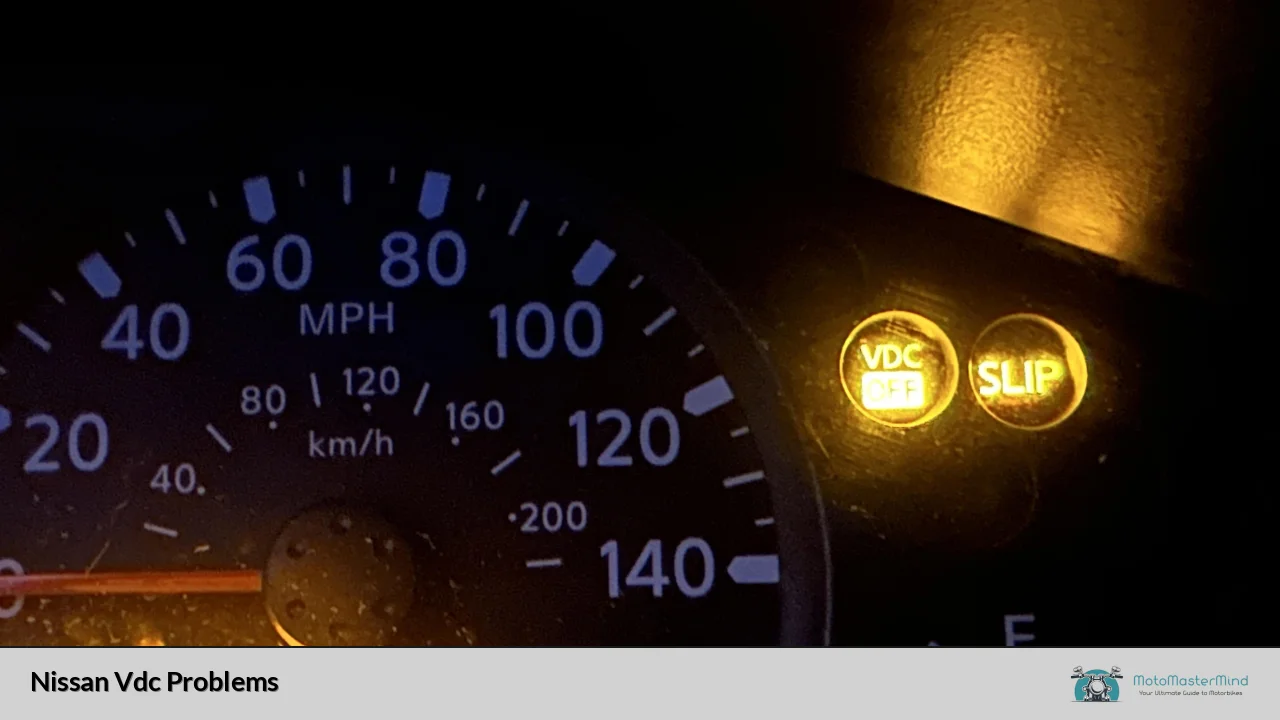Are you experiencing issues with your Nissan vehicle’s VDC (Vehicle Dynamic Control) system? Don’t worry, you’re not alone. Many Nissan owners have encountered problems related to the VDC system, and understanding the causes and solutions can help you address the issue effectively.
The VDC system in Nissan vehicles is designed to enhance stability and control by automatically adjusting engine power and applying individual wheel brakes when necessary. However, like any complex system, it can sometimes encounter problems. One common issue reported by Nissan owners is the VDC warning light illuminating on the dashboard. When this happens, it indicates a potential problem with the VDC system that needs attention.
Several factors can trigger VDC problems in Nissan vehicles. One possible cause is a faulty wheel speed sensor. These sensors provide crucial data to the VDC system, allowing it to monitor individual wheel speeds and make adjustments accordingly. If a sensor malfunctions or becomes damaged, it can disrupt the VDC system’s operation and trigger the warning light.
Another potential culprit is a malfunctioning ABS (Anti-lock Braking System). The ABS works closely with the VDC system to ensure optimal braking performance. If the ABS encounters an issue, such as a faulty pump or sensor, it can affect the VDC system’s functionality as well.
Electrical faults, including loose connections or damaged wiring, may also lead to VDC problems. Any disruption in the electrical circuitry of the VDC system can result in erroneous readings or a complete system failure.
To address VDC problems in your Nissan vehicle, it’s recommended to consult a qualified mechanic or visit an authorized Nissan service center. They have the expertise and diagnostic tools to identify the specific cause of the issue and perform the necessary repairs or replacements.
Nissan Faces Consumer Backlash as VDC Problems Plague Vehicle Safety
Introduction:
Have you ever wondered about the safety of your vehicle? Nissan, a renowned automaker, is currently grappling with a consumer backlash due to widespread issues related to their Vehicle Dynamic Control (VDC) system. This crucial safety technology, designed to enhance control and stability on the road, has been causing concern among consumers. In this article, we will delve into the details surrounding the VDC problems faced by Nissan, exploring their impact on vehicle safety.
Unveiling the VDC System:
Nissan’s VDC system is an advanced safety feature that utilizes sensors located throughout the vehicle to monitor various parameters such as wheel speed, steering angle, and lateral acceleration. By analyzing these inputs, the system can detect potential loss of control and intervene by applying individual brakes and adjusting engine power to help keep the vehicle on its intended path. It is a critical component in ensuring driver and passenger safety.
Consumer Backlash and Safety Concerns:
Unfortunately, numerous Nissan owners have expressed dissatisfaction with the performance of the VDC system, citing concerns about its reliability and effectiveness. Reports suggest instances where the VDC has engaged unexpectedly or failed to engage when needed, potentially compromising vehicle safety in critical situations. These issues have raised questions about Nissan’s commitment to providing reliable safety features in their vehicles.
Implications for Nissan:
The consumer backlash resulting from the VDC problems poses significant challenges for Nissan. With heightened awareness around vehicle safety, customers expect seamless and dependable systems that work flawlessly in all conditions. The negative publicity generated by these issues not only affects customer trust but also impacts Nissan’s reputation as a manufacturer committed to prioritizing safety.
Addressing the Concerns:
In response to the consumer backlash, Nissan has acknowledged the reported VDC problems and expressed its commitment to resolving them promptly. The automaker’s engineers are working diligently to identify the root causes and develop effective solutions to rectify the issues. By addressing these concerns in a transparent manner and implementing appropriate measures, Nissan aims to regain customer confidence and reinforce its dedication to vehicle safety.
Conclusion:
Nissan finds itself facing a challenging situation as consumer backlash grows due to VDC problems that plague vehicle safety. The reliability of the VDC system is crucial for ensuring driver and passenger safety, and Nissan’s reputation hangs in the balance. However, by actively addressing the concerns raised by consumers and taking swift corrective action, Nissan has an opportunity to rebuild trust and demonstrate its unwavering commitment to delivering safe and reliable vehicles.
Investigation Reveals Widespread Nissan VDC Problems Causing Concern among Car Owners
Introduction:
If you’re a proud owner of a Nissan vehicle, there’s some concerning news that you need to be aware of. An in-depth investigation into Nissan vehicles has uncovered a widespread issue related to the Vehicle Dynamic Control (VDC) system. This revelation has left many car owners worried about the safety and performance of their beloved Nissans. In this article, we will delve into the details of the investigation and shed light on the implications for Nissan owners.
Understanding Nissan VDC Problems:
The investigation conducted by automotive experts has revealed significant problems with the Nissan VDC system. The VDC system plays a crucial role in enhancing the stability and control of the vehicle, especially during challenging driving conditions. It uses various sensors and algorithms to detect and mitigate potential skids or loss of control, ensuring a safer driving experience.
However, the investigation found that a considerable number of Nissan vehicles were experiencing malfunctions in their VDC systems. This malfunction could result in unexpected activation of the system, leading to sudden braking or loss of control while driving. Such incidents pose serious risks to both the driver and other road users, making it imperative to address these issues promptly.
Implications for Nissan Owners:
Naturally, Nissan owners are deeply concerned about the implications of these VDC problems. The safety and reliability of their vehicles are paramount, and any issues with the VDC system can compromise these crucial aspects. Drivers depend on their VDC system to provide stability and help prevent accidents, so discovering flaws in this vital component is disconcerting.
Owners should be proactive in addressing these concerns. If you own a Nissan vehicle and suspect any issues with your VDC system, it is essential to contact an authorized Nissan service center immediately. Professional technicians can assess the problem and perform any necessary repairs or updates to ensure your vehicle operates safely and optimally.

Conclusion:
The widespread Nissan VDC problems uncovered in the investigation have caused significant concern among car owners. The malfunctioning of the VDC system can compromise the safety and performance of Nissan vehicles, posing potential risks to drivers and others on the road. Nissan owners should prioritize addressing these issues by seeking assistance from authorized service centers. By taking proactive measures, owners can ensure their vehicles are safe and reliable for a worry-free driving experience.
Are Nissan VDC Issues Putting Drivers’ Lives at Risk? Experts Weigh In
Are you a Nissan owner or considering buying one? Then you might want to pay attention to the potential risks associated with the Vehicle Dynamic Control (VDC) system in certain Nissan models. VDC is an advanced safety feature designed to enhance vehicle stability and control, but recent reports suggest that some Nissan vehicles may be experiencing issues with this system. The question on many drivers’ minds is whether these VDC issues pose a threat to their safety on the road. Let’s delve deeper into this matter and hear what experts have to say.
The VDC system in Nissan vehicles is responsible for monitoring various parameters such as wheel speed, steering angle, and lateral acceleration. It uses this information to detect and prevent skidding or loss of control by applying individual brakes and adjusting engine power as necessary. When functioning properly, VDC can be a valuable tool in preventing accidents and maintaining vehicle stability.
However, there have been accounts of Nissan owners experiencing problems with their VDC systems. Some drivers have reported instances where the VDC warning light illuminates unexpectedly, signaling a malfunction in the system. This could potentially compromise the effectiveness of the VDC system and increase the risk of accidents.
To shed light on this issue, experts have weighed in on the matter. According to automotive safety specialists, any malfunction or failure of the VDC system can indeed put drivers’ lives at risk. The sudden loss of control or compromised stability of a vehicle can lead to accidents, especially in hazardous driving conditions or emergency situations.
Nissan has acknowledged these concerns and initiated investigations into the reported VDC issues. They are actively working to identify the root causes and develop solutions to address the problem. In the meantime, it is advisable for Nissan owners to stay vigilant and seek assistance from authorized service centers if they encounter any irregularities with their VDC system.
While the VDC system in Nissan vehicles is designed to enhance safety, reports of malfunctions raise concerns about potential risks for drivers. With experts highlighting the importance of a well-functioning VDC system, it is crucial for Nissan to address these issues promptly. Drivers should remain aware of any warning signs and take appropriate action to ensure their safety on the road.
Exclusive: Inside Look at Nissan’s VDC Troubles and Their Impact on the Automotive Industry

Introduction:
Have you ever wondered what goes on behind the scenes in the automotive industry? Today, we’ll take an exclusive look into Nissan’s VDC (Vehicle Distribution Center) troubles and explore their significant impact on the industry as a whole. Buckle up as we delve into this fascinating topic!
Unveiling the Nissan VDC Troubles:
Nissan, a renowned name in the automotive world, has been facing challenges with its Vehicle Distribution Centers. These centers play a crucial role in efficiently distributing vehicles from manufacturing plants to dealerships all over the country. However, recent operational issues have caused disruptions in this process.

The Complexity of VDC Operations:
To understand the magnitude of the troubles, it’s essential to grasp the complexity of VDC operations. These centers act as logistical hubs, receiving, inspecting, and preparing vehicles for delivery. They handle tasks such as quality checks, inventory management, and even vehicle customization based on customer preferences. Any disruption in these operations can have far-reaching consequences.
Implications for Nissan:
The VDC troubles have directly impacted Nissan’s ability to deliver vehicles to its dealerships promptly. This delay not only frustrates customers eagerly awaiting their new cars but also affects the company’s revenue and reputation. Customers may turn to competitors if they face extended wait times or uncertainty regarding vehicle availability. Furthermore, the additional costs incurred due to inefficiencies in the distribution process put a strain on Nissan’s financial stability.
Industry-Wide Ripples:
Beyond Nissan, the impact of these VDC troubles reverberates throughout the entire automotive industry. As one of the major players in the market, any disruption in Nissan’s production and distribution affects countless suppliers, dealerships, and service providers. It creates a ripple effect, causing delays and added pressure on other manufacturers who might need to adjust their own strategies to compensate for the imbalance.
Conclusion:
Nissan’s VDC troubles pose significant challenges for the company and have far-reaching consequences across the automotive industry. The disruptions in vehicle distribution affect the timely delivery of cars to customers, impacting Nissan’s revenue and reputation. Furthermore, the ripple effect extends to suppliers, dealerships, and other manufacturers, creating a strain on the industry as a whole. As Nissan works towards resolving these issues, the automotive world eagerly awaits smoother operations and a return to seamless vehicle distribution.

